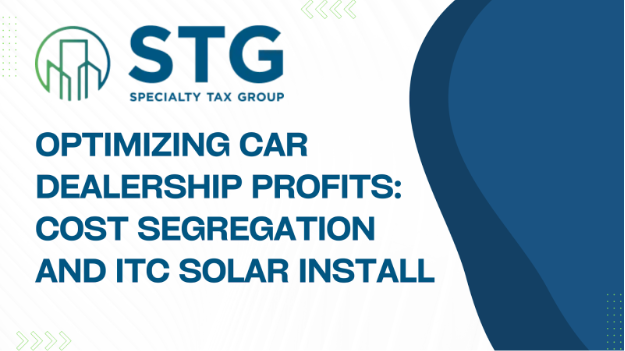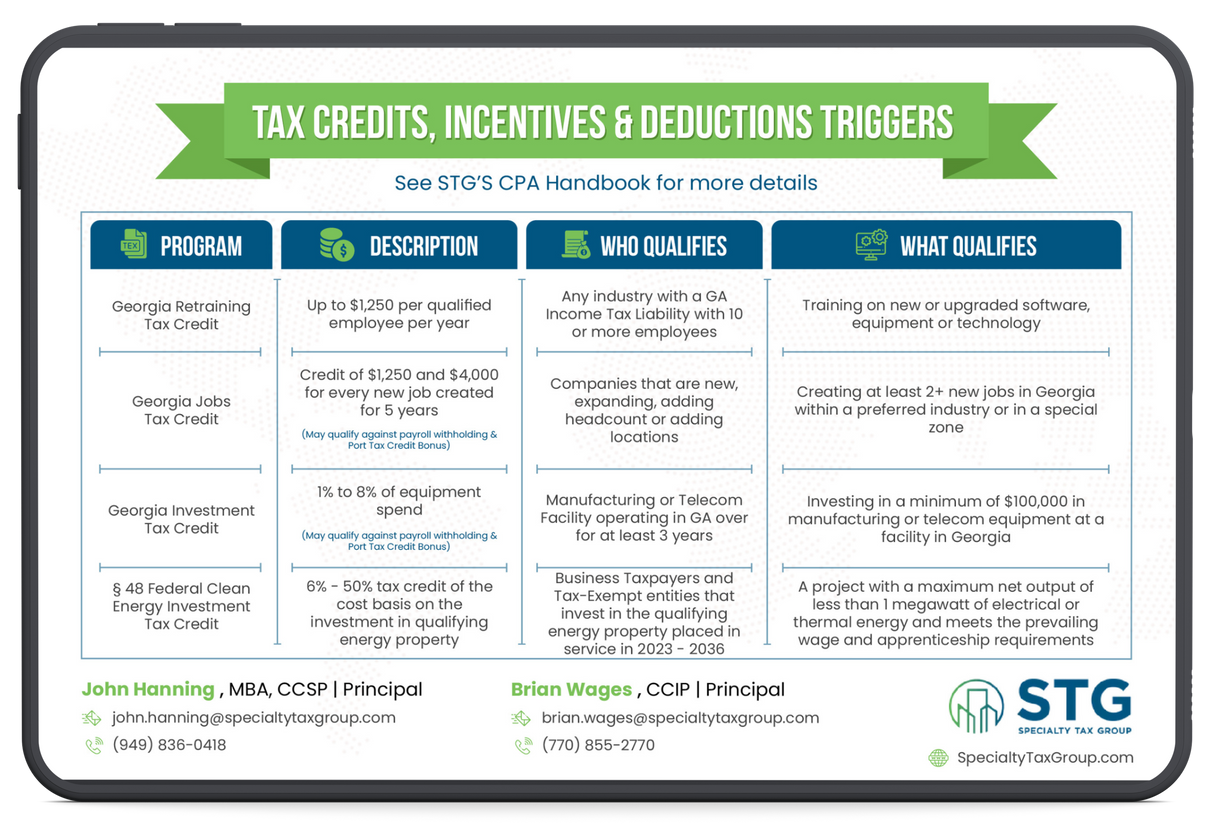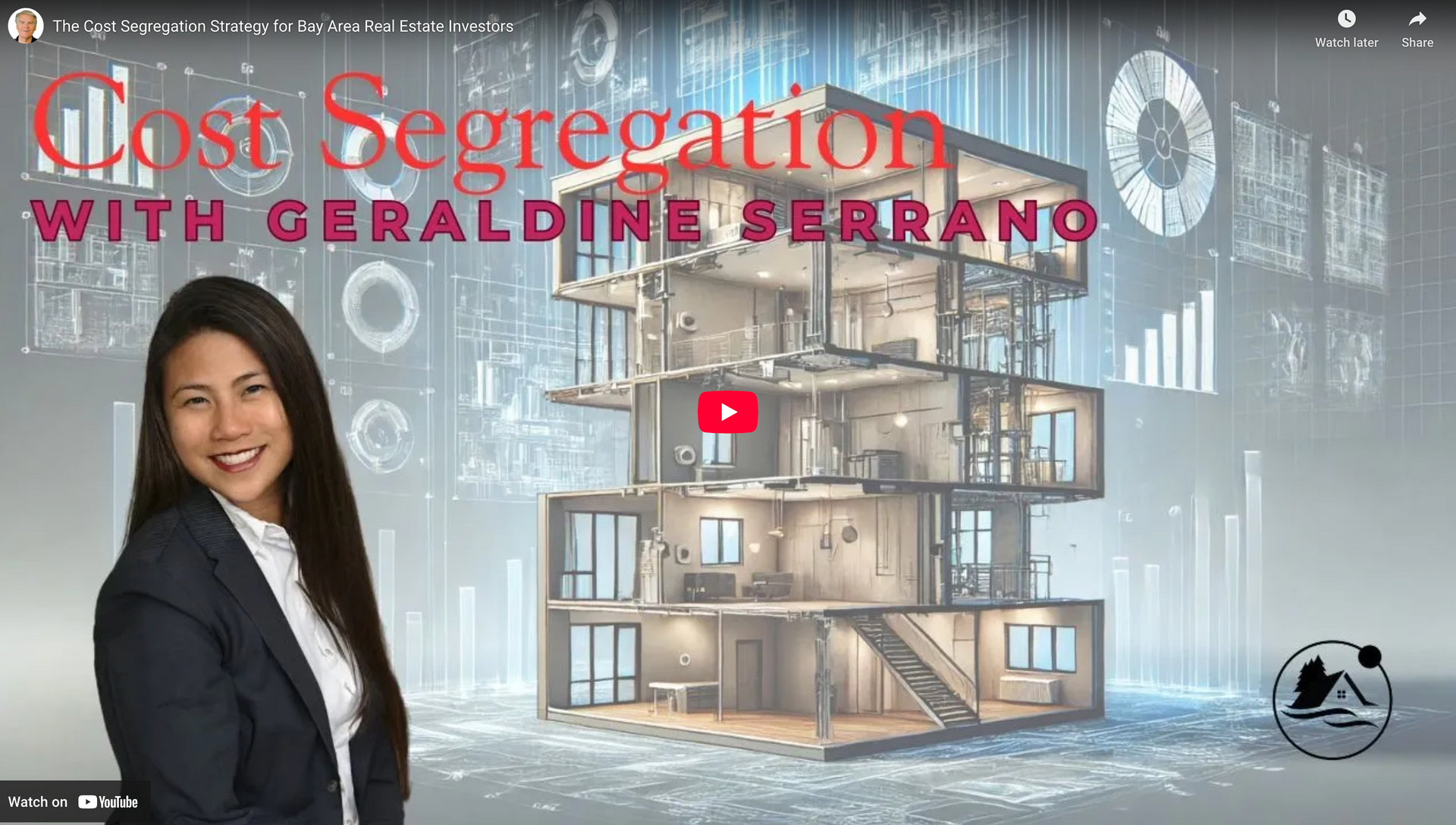This blog post has been researched, edited, and approved by John Hanning and Brian Wages. Join our newsletter below.
Newsletter Form
Thank you for joining our newsletter. We will email you the latest updates every other Thursday at 12pm.
Please try again later.
Are you feeling the pressure of rising costs in the automotive industry? In a landscape where margins are thinning and competition is intensifying, innovative solutions are not just beneficial – they are essential. As a car dealership owner, you're in a unique position to steer your business toward greater profitability while making a positive impact on the environment.
This is where cost segregation and the Investment Tax Credit (ITC) solar installations come into play. These strategies are more than just buzzwords; they are practical, actionable solutions that can significantly enhance your dealership's financial performance.
Cost segregation can unlock hidden tax savings, while ITC solar installations can reduce energy costs and boost your green credentials. Let's dive into how these approaches can rev up your dealership's profits and drive you toward a sustainable future.
Defining Cost Segregation
Cost segregation is a critical tax strategy for car dealerships. It involves dissecting the costs associated with building or property acquisition and categorizing components into shorter depreciation periods. This practice enables dealerships to speed up depreciation deductions, thereby reducing taxable income.
Car dealerships, often engaged in significant renovations or constructing new facilities, can greatly benefit from cost segregation. Components like electrical systems, and parking lots, integral to these projects, are prime candidates for accelerated depreciation. A thorough cost segregation study can reallocate these costs into shorter depreciation timelines, increasing tax deductions and enhancing cash flow.
Charging Stations and Green Compliance
Tax credits can significantly reduce the tax burden for individuals and businesses, providing incentives for activities that foster economic growth, innovation, and social welfare. However, navigating the world of tax credits can be complex, and consulting with a tax professional or thoroughly researching official guidelines is advisable to ensure eligibility and optimize benefits.
ITC Solar Installations: Embracing Renewable Energy
The Investment Tax Credit (ITC) is a significant federal tax incentive promoting the adoption of solar energy systems. Available to both residential and commercial entities, including car dealerships, it offers a tax credit for a portion of the cost of installing solar panels or related equipment.
Solar energy brings numerous benefits. For car dealerships, the long-term cost savings are particularly attractive. Solar panels, once installed, provide virtually free electricity, leading to substantial cost reductions over time. Many dealerships are installing these solar panels to offset the cost of installing electric vehicle charging stations. This transition not only saves money but also positions dealerships as environmentally responsible businesses, enhancing their public image.
The environmental advantages of solar power cannot be overstated. Unlike traditional electricity generation, which often relies on fossil fuels, solar energy is clean and renewable, significantly reducing greenhouse gas emissions and helping in the fight against climate change
Adopting solar power also grants dealerships a degree of energy independence, safeguarding them against grid instability and fluctuating energy prices. This self-sufficiency ensures a reliable energy supply, which is essential for smooth dealership operations.
Alternative Fuel Vehicle Refueling Property Credit
This tax credit, revitalized by the Inflation Reduction Act, supports businesses and individuals installing clean-burning fuel refueling infrastructure, including EV charging stations. Qualifying properties installed during the tax year, especially within specific community categories from 2023, can benefit significantly.
Businesses adhering to certain wage and apprenticeship requirements can claim a credit of up to 30% with a $100,000 limit per item. For non-depreciating property, a 30% credit up to $1,000 per item is available. The claiming process involves Form 8911 for 2022 tax year filings, with updated forms and instructions forthcoming for 2023.
In summary, cost segregation and ITC solar installations offer car dealerships a dual advantage: optimizing profits through tax savings and aligning with green energy initiatives. The inclusion of the Alternative Fuel Vehicle Refueling Property Credit further incentivizes the adoption of EV infrastructure, positioning car dealerships at the forefront of automotive industry evolution.
Benefits of Cost Segregation in Car Dealerships
- Reducing Tax Liabilities: Cost segregation is a strategic tax planning method that significantly benefits car dealerships by reducing their tax liabilities. By categorizing various components of their property into shorter recovery periods, dealerships can claim larger depreciation deductions sooner. This accelerated depreciation results in a substantial decrease in taxable income, thereby reducing the overall tax burden for the dealership in the initial years of asset acquisition.
- Improving Cash Flow: Another crucial advantage of cost segregation is the enhancement of cash flow. The immediate tax savings generated from accelerated depreciation provide dealerships with additional capital. This liquidity boost can be reinvested into the business, aiding in expansion, modernization, or other operational enhancements. The improved cash flow also offers greater financial flexibility to the dealership, supporting its long-term growth and stability. With interest rates so high, generating this cash flow through cost segregation is more valuable than ever.
- Leveraging ITC Benefits for Solar Installations: Cost segregation also plays a pivotal role in maximizing the benefits of the Investment Tax Credit (ITC) for solar installations. By segregating the costs associated with solar panel installation, dealerships can claim a more significant portion of the ITC.
Advantages of ITC Solar Installations
- Financial Incentives of the ITC: The Investment Tax Credit (ITC) is a key financial incentive that encourages the adoption of solar energy in businesses, including car dealerships. The ITC allows for a tax credit of between 6% and 50% of the eligible costs for solar installations. This substantial credit helps mitigate the initial expense of installing solar panels, making renewable energy a more accessible and financially attractive option for dealerships.
- Combining ITC with Tax Deductions:
Car dealerships can further enhance their financial gains by combining the ITC with tax deductions, such as the Modified Accelerated Cost Recovery System (MACRS). MACRS permits businesses to recuperate the cost of solar energy systems through yearly depreciation deductions. Utilizing both the ITC and MACRS, dealerships can maximize their investment returns, significantly lowering the overall cost of adopting solar energy.
Environmental Impact and Brand Image
- Positive Environmental Impact of Solar Energy: Switching to solar energy has a profound positive impact on the environment. Solar power is a clean, renewable source of energy that reduces reliance on fossil fuels, thereby decreasing greenhouse gas emissions and contributing to the fight against climate change. For car dealerships, utilizing solar energy means playing a vital role in promoting environmental sustainability.
- Enhancing Dealership’s Brand Image:
Embracing green initiatives, such as solar energy, can significantly enhance a car dealership's brand image. Today's consumers are increasingly environmentally conscious and tend to support businesses that demonstrate a commitment to sustainability. By adopting green practices, dealerships not only contribute to environmental conservation but also appeal to a broader customer base, particularly those who prioritize eco-friendly choices. This enhanced brand image can lead to increased customer loyalty, a stronger reputation in the community, and potentially, an expanded market share.
Propel Your Dealership Forward with Specialty Tax Group
As we've explored, the integration of cost segregation and ITC solar installations presents a powerful opportunity for your car dealership. These strategies not only pave the way for significant tax savings and improved cash flow but also align your business with essential green energy initiatives.
Recap of Key Points:
- Cost Segregation: Accelerate depreciation on specific assets, leading to reduced tax liabilities and enhanced cash flow.
- ITC Solar Installations: Gain substantial tax credits for adopting solar energy, thereby lowering initial costs and promoting long-term sustainability.
- Environmental Responsibility: By embracing solar power, your dealership contributes to environmental conservation, bolstering your brand's appeal to eco-conscious consumers.
Now is the time to consider how these strategies can revitalize your dealership's financial health and ecological footprint. Whether you're looking to maximize your tax benefits or invest in renewable energy solutions, understanding and implementing these approaches can be a game-changer for your business.
Explore More with Specialty Tax Group (STG)
At Specialty Tax Group (STG), we recognize that each dealership has its unique challenges and opportunities. This is why we offer personalized consultation services tailored to your specific needs. Our team of experts is equipped to guide you through the intricacies of cost segregation studies, help you navigate the ITC application process for solar installations, and ensure you're making the most informed decisions for your business.
Don't miss out on the opportunity to drive your dealership toward greater profitability and sustainability.
Reach out
to Specialty Tax Group today for a consultation, and take the first step in transforming your dealership's financial and
environmental strategies.
2024 Tax Guide
Have A Question?
Contact us today and our friendly team will reach out as soon as possible.
All Rights Reserved | Specialty Tax Group | Powered by Automationlinks | Privacy Policy






